O processo clínico informatizado: mera discussão académica ou uma tecnologia essencial?
DOI:
https://doi.org/10.20344/amp.2936Resumo
The publication of the results of a study on improving patient records, recently completed by the Institute of Medicine of the National Academy of Sciences, in the United States, where it was concluded that the Computer-Based Patient Record (CPR) was an essential technology for health care, witnesses the importance and expectations that patients, physicians and other health care professionals, hospital administrators and health systems managers, place on forms of management of clinical information that are more accurate, complete and efficient than what is possible with current methods. A large amount of work is in order, to develop standards for sharing clinical data between clinical information systems and for representing medical terminology and knowledge, to create legislation regarding data protection in CPR, and for the preparation of health care professionals for the information and technological demands of the future. Recent developments in database integration, and the experience of several CPR systems developed at academic institutions, have led to the progressive delineation of the architecture of modern CPR systems.Downloads
Downloads
Como Citar
Edição
Secção
Licença
Todos os artigos publicados na AMP são de acesso aberto e cumprem os requisitos das agências de financiamento ou instituições académicas. Relativamente à utilização por terceiros a AMP rege-se pelos termos da licença Creative Commons ‘Atribuição – Uso Não-Comercial – (CC-BY-NC)’.
É da responsabilidade do autor obter permissão para reproduzir figuras, tabelas, etc., de outras publicações. Após a aceitação de um artigo, os autores serão convidados a preencher uma “Declaração de Responsabilidade Autoral e Partilha de Direitos de Autor “(http://www.actamedicaportuguesa.com/info/AMP-NormasPublicacao.pdf) e a “Declaração de Potenciais Conflitos de Interesse” (http://www.icmje.org/conflicts-of-interest) do ICMJE. Será enviado um e-mail ao autor correspondente, confirmando a receção do manuscrito.
Após a publicação, os autores ficam autorizados a disponibilizar os seus artigos em repositórios das suas instituições de origem, desde que mencionem sempre onde foram publicados e de acordo com a licença Creative Commons









